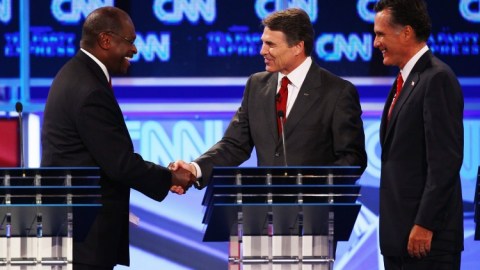Cain in Context (or Cain Herman Do It?)

As of right now, polls show that Herman Cain is in the lead for the Republican presidential nomination.
They also show that likely Republican voters really like him. And there’s a lot to like, after all. Why wouldn’t an obviously very smart, entrepreneurial, black, Baptist, southern, mathematically very literate, authentic, “outsider” candidate with formidable rhetorical and even singing gifts be just what that party needs?
The studies show that the likely Republican voters want someone they can admire and shares their views. Electability is less on their minds.
The same studies have also shown they don’t want Romney. They don’t like him that much and are suspicious of his views (on health care, for example). They find him acceptable, but would prefer an alternative that inspires their enthusiasm.
Romney’s position in the polls stays about the same week after week. And various alternatives—Rick Perry, for example—take the lead for a while.
It could be the case that Cain will suffer the same fate as Perry. Maybe he’ll self-destruct over the next month or two. Then perhaps Mitt will be the last man standing. But I doubt the outcome will be anywhere near that simple.
Chris Christie, quite an admirable and intelligent man, seemed to do the right thing by endorsing Romney soon after deciding it wasn’t his time. And he seemed deliberately to fuel speculation about a Romney-Christie ticket. That’s quite a competent ticket! It seems to make a lot of sense. The Republicans have the southern and evangelical vote locked down. So why not have a ticket that doesn’t saddle them with evangelical or even tea-party baggage? That’s the way to get those key swing voters!
But that endorsement—and many others—may be too soon. It may backfire. Nobody has voted yet, after all.
The problem, of course, is that so many of the primary voters will be evangelical and tea-party baggage, and they are energized against the Republican “Establishment.”
Consider Cain’s 9-9-9 plan. The Democrats will skewer it as raising taxes on the vulnerable middle class and cutting taxes on the rich. They will add it’s something that would only be put forward by someone fundamentally hostile to our entitlements—to Medicare, Social Security, and so forth.
That doesn’t mean lots of Republican voters look at the plan that way. They’re often for tax reform that will decrease taxes on productivity (income taxes), especially the productivity of the rich, in the name of economic growth and an individualistic understanding of justice. And they often believe that big, entitlement-laden government encourages dependency and is unsustainable, not to mention unconstitutional. They want an entrepreneurial president who’ll govern the country like a business, whereas Romney would govern it like a corporation.
The Democrats have already conceded that the election will be close—or not a triumphant affirmation of Obama’s changes. Obama will win, they think, because at least he’ll be better than his actual Republican opponent.
They would campaign against Cain as not possessing the competence required to be president—no political experience. And, of course, for being too dangerously ideological.
Romney, who displays his great competence in debate after debate, is also much less ideological (or more flip-floppy). He would be, at first glance, harder to beat. But he just doesn’t inspire the enthusiasm that both Obama and Cain can.
So do the Republicans need a Romney-Cain ticket (or a Cain-Romney ticket)? Certainly the diversity of the combo of an African-American and a Mormon is hard not to appreciate.





